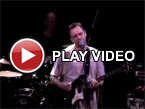Desolation Wilderness, "New Universe"
 On cool summer mornings along the Pacific, clouds will roll in from the sea and blot out the sun, suffusing the land with a luminous gloom. Like an overcast day, Desolation Wilderness envelopes the listener by obscuring the outside world. In New Universe, the group blends a wide range of instruments and voices into wavelike masses of hazy rock and roll, evoking the loneliness and grandeur of a deserted coastal highway.
On cool summer mornings along the Pacific, clouds will roll in from the sea and blot out the sun, suffusing the land with a luminous gloom. Like an overcast day, Desolation Wilderness envelopes the listener by obscuring the outside world. In New Universe, the group blends a wide range of instruments and voices into wavelike masses of hazy rock and roll, evoking the loneliness and grandeur of a deserted coastal highway.
For listeners raised on oldies radio and camping trips, Desolation Wilderness will sound immediately familiar. Even at its most dramatic, their music has a muted quality that mimics the noise of some distant AM station. Melodies emerge and then vanish, like a phrase from a favorite song caught through layers of static. Nicholaas Zwart, the main vocalist for the band, sings in a high, clear voice that would be perfectly intelligible were it not submerged under gallons of reverb. The effect garbles his words, giving them the tone of a bedraggled, early-morning phone call. They suggest rather than proclaim, sigh instead of shout. Zwart’s lyrics merge with the sounds around them, their precision lost in the ether.
Alone, the production on New Universe is not enough to suggest vast open spaces. The songs already have that quality built into them. They resemble the surface of the ocean pictured on the album cover: an endless progression of swells emanating just over the horizon. The opener, “Venice Beach,” begins with silvery cymbal fills anchored by floating bass notes. It slowly builds, until the main riff emerges from the din, crashing like breakers against a pier. Many of the songs feature interludes, where the band will slow the tempo and let their instruments ring out, notes glimmering like tide-pool reflections. Tambourine, glockenspiel, analogue synths, and wood-blocks all blend into a single chiming, clicking mass, holding the music in supple tension as the band awaits the return of the main melody.
No matter how diffuse the songs on New Universe become, they never degenerate in formless noodling. The band keeps its momentum, pushed forward by drummers Evan Hashi and Andrew Dorsett. Both play in a relaxed style with crisp snare and cymbal work. In “Slow Fade,” drum taps weave between lilting guitar lines, the rhythm at once stiff and gentle. The beat fades for a moment but re-emerges with even more confidence, ending the song in a shimmering coda.
Desolation Wilderness conjures beauty with deceptive ease. Since their music is both laid-back and melancholy, it is easy to reflexively think of them as underachievers. Generating spacey sound-effects may be easy, but making the result engaging is not. So many attempts at evoking atmosphere fail because of shear weightlessness. New Universe flirts with being superfluous but still holds-up under serious listening. Desolation Wilderness should be proud; most bands don’t make it out of such nebulous territory intact.
samples:



